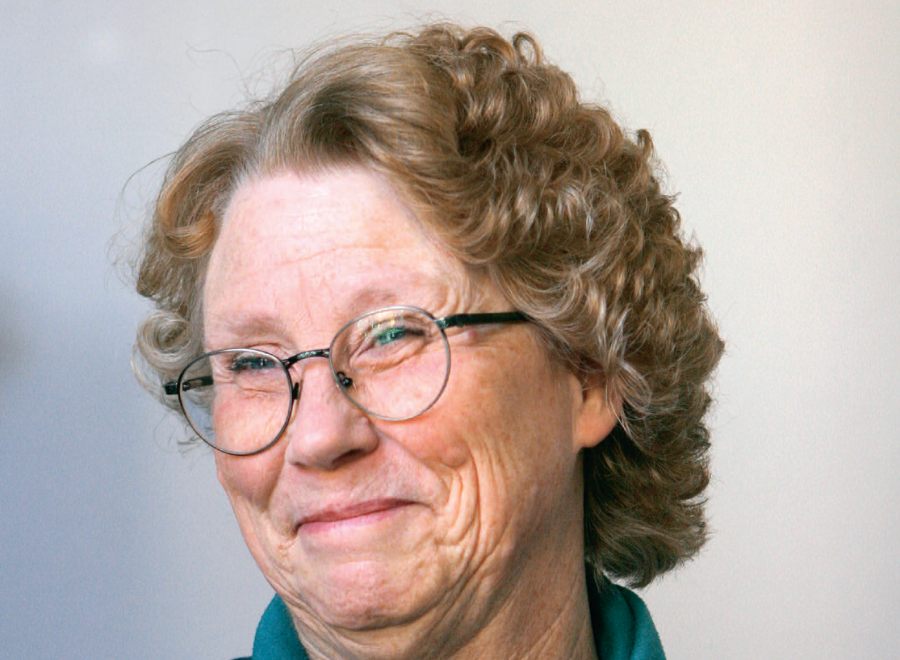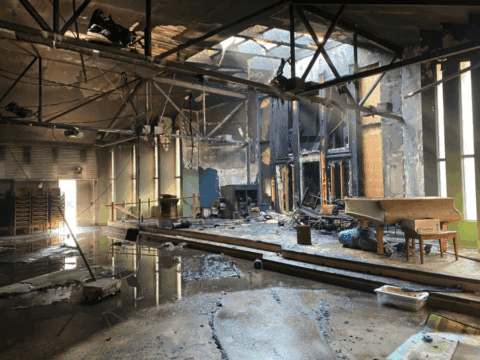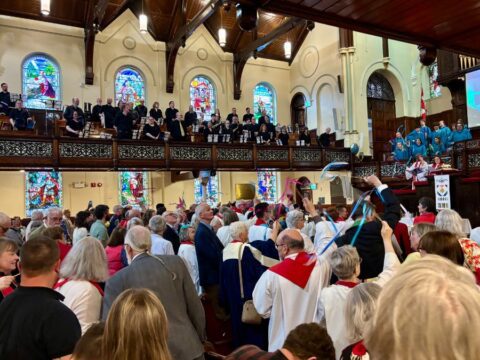The United Church’s new staffperson for refugees, Susan Ferguson, talks to Jocelyn Bell about church budget cuts, who’s doing advocacy and why congregations should sponsor Iraqi refugees.
JOCELYN BELL: How did you get this job?
SUSAN FERGUSON: At the point when those big budget cuts happened to the United Church’s justice portfolio — including its staffperson on refugee issues — in June 2007, I was in New York. Everyone was saying, “What’s going to happen? How are we going to do these things?” At that point, it was conceivable they could have closed down the whole refugee sponsorship program.
I said, “When you’re talking about the refugee portfolio, I could be part of some of the conversations if you want. I would have some ideas.” Because previously, I was executive director of an agency now called AURA, the Anglican United Refugee Alliance. So the next thing I knew, there was a proposal that I supervise the transition of that portfolio, and it kind of grew from there.
JB: What do you mean by “transition”?
SF: Transition could have been transitioning our way out of private sponsorship or transitioning those responsibilities to individual Conferences.
JB: Why was the refugee sponsorship program at risk?
SF: The United Church has had an agreement with the federal government since 1979 for its sponsorship of refugees. Everything goes through our national agreement. We have a lot of sponsorship activity — sponsorships that have been submitted, people who are waiting to hear, people who have arrived. And those were all contracts signed with the government. So in point of fact, if we did not have a staffperson who could have a role in that, the responsible thing would have been to pull out of the agreement. We didn’t go and do a poll or anything, but we just knew that no one would want to see that happen.
JB: What happened after you got into the job?
SF: The person who had held the position for 14 years, Heather Macdonald, had brought together a group who are referred to as the Refugee Advisory Group. They produced commentary and policy suggestions for the United Church on things like trafficking, deportation, sanctuary. So it seemed appropriate to devolve a lot more responsibility to them so that they are the main contact people in their regions. These 10 people are doing this totally volunteer — and without a blink, they all said that they were prepared to do it.
JB: How is it working so far?
SF: I would say that this model of using regional advisers is proving itself. For instance, we had a sponsored person who committed suicide a month or so ago. This was very difficult right across the board. This person was responsible for a young man who was underage. What now happens to this young man? Everything was in the person’s name, so all the paperwork had to be redone. But I knew I had a regional adviser who was much closer to them. She could share the burden with them.
JB: You work from Manhattan. How do you find doing this job remotely?
SF: It’s not really that difficult. A lot of it can be done on the phone, email, that kind of thing. I guess the thing that I find difficult is working totally separate from colleagues. I miss the stimulation of talking about things in person. I’m at the General Council Office in Toronto about one week every six weeks.
JB: So if responsibility for the refugee file devolved to people at the Conference level, does that mean the church no longer needs a national staffperson?
SF: That part is still a work in progress. Not every Conference is interested in having a sponsorship agreement, because the financial buck stops there. The other part of this is Citizenship and Immigration. This is a huge bureaucracy and they really hate change. We have to be very judicious about saying that we want to change our whole structure for how we do sponsorship.
JB: How much of your job is about refugee advocacy? Or is any of it?
SF: There are all sorts of issues, broad-scale issues, where it would be possible for the United Church nationally to weigh in. Right now, there just isn’t the capacity to do that. You know, I hear about something, but I have no mandate to act on it. For example, the whole thing around claimant refugees in Canada and the fact that there isn’t an adequate provision for appealing decisions. That’s been something that the United Church and other groups have been advocating about for years. Unfortunately, these are all still problems. It’s by no means clear how that advocacy piece will go ahead.
JB: Or, if it even will?
SF: Well, there’s good news. A position has been added to the Justice, Global and Ecumenical Relations unit for public witness. A lot of times, church members say, that’s all very well for us to talk, but we want the national church to say something. Is that going to be from our unit? Is that going to come from the general secretary? From the moderator? Barbara Lloyd, who previously worked for Toronto Conference, is the public witness person who will put some coherence behind that.
JB: Let’s say I’m a minister and a refugee shows up at my church asking for sanctuary. Whom do I call?
SF: You would definitely call me at the national office and I would make sure you were connected to people in your area. But the important thing to remember is legally, it’s not The United Church of Canada that will be providing sanctuary to this person, it’s individual congregations. Frankly, I will feel I’ve done my job if no one goes into sanctuary. It is a very radical and difficult step. It’s very hard for the family; it’s very hard for the church. The government, as a general rule, just stonewalls and doesn’t want to negotiate with people in sanctuary.
JB: What’s on the horizon for congregations interested in refugee sponsorship?
SF: We’re going to start getting Iraq cases. Now that invasion and war have created this huge humanitarian crisis, the Canadian government has agreed to take 2,000 Iraqi refugee families. There are several issues around that. One is that the government agreed to the quota by reducing the numbers they were accepting from other areas. Another is our country’s complicity in a war, whether we’re sending troops to it or not.
This is maybe one of the more pressing examples where United Church congregations can become politically active and advocate for a true resolution to conflict. And, of course, they can absolutely respond by considering sponsoring refugees from Iraq.
My big hope is that this would be an occasion for people to understand what it means if we are indeed all children of God and all mutually responsible for one another.
***
This story first appeared in The United Church Observer’s June 2008 issue with the title “‘I will feel I’ve done my job if no one goes into sanctuary.’”














